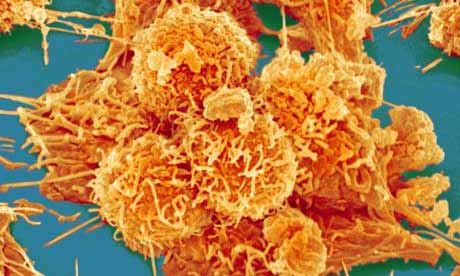
Cancer cells seen through an election microscope. Cancer Research UK have produced figures that show a 40% reduction in cancer death in the 50-59 age group.
Deaths from cancer among 50-somethings have fallen to their lowest level in 40 years, thanks to better diagnosis, fewer people smoking and new drugs improving patients' chances of survival.
In 1971 over 21,300 people in the UK aged between 50 and 59 died of cancer, but in 2010 a total of just under 14,000 did so - a fall of 40% - according to new figures produced by Cancer Research UK (CRUK).
The overall rate of people in that age group dying from the disease has dropped from 310 per 100,000 people to 185 per 100,000 people over that period. For example, the proportion of 50 to 59-year-olds dying of either stomach cancer or Hodgkin's lymphoma has dropped by more than 75%. While about 25 people in every 100,000 died of stomach cancer in 1971, that had fallen to 4.2 by 2010. Similarly, the rate of deaths from Hodgkin's lymphoma has dropped from more than two per 100,000 to 0.5 per 100,000.
Among men, the biggest drops have been seen in stomach, testicular and lung cancer and Hodgkin's lymphoma, while among women it has been in cervical, stomach and bowel cancer, and Hodgkin's lymphoma.
"Our latest figures show that for the first time in the last four decades cancer deaths among people aged 50-59 have dropped below 14,000 a year. This is really encouraging news and it highlights the huge progress we have made", said Professor Peter Johnson, CRUK's chief clinician.
The gradual decline in smoking which began about 1970 has also been "a big help", said Johnson, as well as the fact that "we are also better at diagnosing cancers early and better at treating them whether by surgery, radiotherapy or chemotherapy", he added, stressing the role of CRUK research in breakthroughs.
The discovery of new drugs such as tamoxifen, which is used to treat breast cancer and the introduction of screening for various forms of cancer have also played a part.
Dr Harpal Kumar, the charity's chief executive, said that despite these improvements "there is still much more to do. Smoking remains the largest cause of cancer, which is why CRUK is petitioning the government to bring in plain packaging of tobacco, so children are less likely to be seduced by the sophisticated marketing techniques designed to make smoking attractive to youngsters."
But the Department of Health said that despite these improvements, the chances of patients in England surviving cancer were still not good enough. "These figures reflect advancements in cancer services, but our survival rates still lag behind comparable countries", said a spokeswoman.
"That's why we are investing more than ?750 million to make sure people are diagnosed with cancer earlier and have better access to the latest treatments. Through our investment our aim is to save 5,000 more lives [in England] every year by 2015 - closing the gap in cancer survival between us and the best-performing countries in the world", she added.
nba all star reserves rock center christine christine will ferrell double fine adventure turbo tax
No comments:
Post a Comment